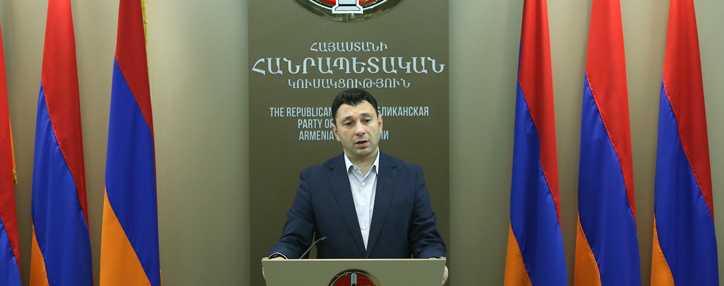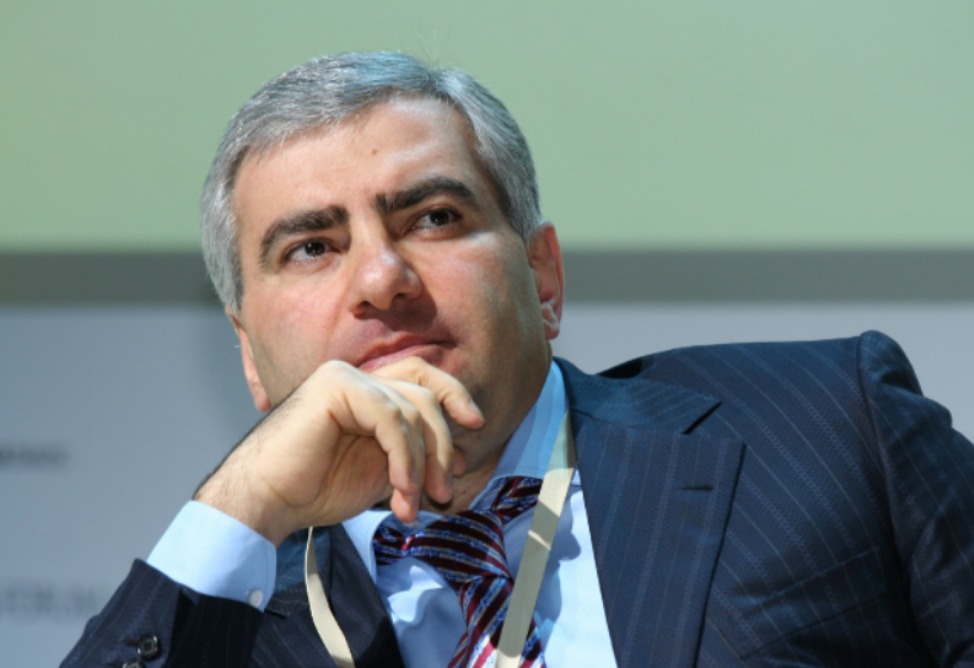International organizations must condemn use of spike missile by Azerbaijan - Sharmazanov
24.10.2017,
13:49
International organizations must condemn the use of Spike missile by Azerbaijan, Eduard Sharmazanov, vice-speaker of the Armenian National Assembly, said Tuesday as he met with Mexican MPs in Artsakh (Karabakh).

YEREVAN, October 24. /ARKA/. International organizations must condemn the use of Spike missile by Azerbaijan, Eduard Sharmazanov, vice-speaker of the Armenian National Assembly, said Tuesday as he met with Mexican MPs in Artsakh (Karabakh).
On Monday at 15:05 local time, Azerbaijani troops breached the ceasefire agreement on the line of contact between Azerbaijani and Artsakh (Karabakh) armed forces by launching Spike anti-tank missile at Artsakh positions.
One day earlier, Azerbaijani troops shelled the opposite side from artillery mounts on the north-eastern section of the contact line in a clear breach of the arrangements made by Armenian and Azerbaijani presidents in Geneva at a recent meeting brokered by the OSCE Minsk Group.
The press office of the Artsakh defense ministry reported that day that the Azerbaijani side has fired five mortar shells and one Spike anti-tank missile.
Strongly condemning the ceasefire breach by Azerbaijan, Sharmazanov said that even after the meeting between the two countries’ presidents in Geneva, Baku is not ready for constructive steps.
He also denounced the use of Spike missile as another display of Azerbaijan’s criminal essence.
Karabakh conflict broke out in 1988 when Karabakh, mainly populated by Armenians, declared its independence from Azerbaijan.
On December 10, 1991, a few days after the collapse of the Soviet Union, a referendum took place in Nagorno-Karabakh, and the majority of the population (99.89%) voted for secession from Azerbaijan.
Afterwards, large-scale military operations began. As a result, Azerbaijan lost control over Nagorno-Karabakh and the seven regions adjacent to it.
Some 30,000 people were killed in this war and about one million people fled their homes.
On May 12, 1994, the Bishkek cease-fire agreement put an end to the military operations.
Тalks brokered by OSCE Minsk Group are being held over peaceful settlement of the conflict. The group is co-chaired by USA, Russia and France. --0-----
On Monday at 15:05 local time, Azerbaijani troops breached the ceasefire agreement on the line of contact between Azerbaijani and Artsakh (Karabakh) armed forces by launching Spike anti-tank missile at Artsakh positions.
One day earlier, Azerbaijani troops shelled the opposite side from artillery mounts on the north-eastern section of the contact line in a clear breach of the arrangements made by Armenian and Azerbaijani presidents in Geneva at a recent meeting brokered by the OSCE Minsk Group.
The press office of the Artsakh defense ministry reported that day that the Azerbaijani side has fired five mortar shells and one Spike anti-tank missile.
Strongly condemning the ceasefire breach by Azerbaijan, Sharmazanov said that even after the meeting between the two countries’ presidents in Geneva, Baku is not ready for constructive steps.
He also denounced the use of Spike missile as another display of Azerbaijan’s criminal essence.
Karabakh conflict broke out in 1988 when Karabakh, mainly populated by Armenians, declared its independence from Azerbaijan.
On December 10, 1991, a few days after the collapse of the Soviet Union, a referendum took place in Nagorno-Karabakh, and the majority of the population (99.89%) voted for secession from Azerbaijan.
Afterwards, large-scale military operations began. As a result, Azerbaijan lost control over Nagorno-Karabakh and the seven regions adjacent to it.
Some 30,000 people were killed in this war and about one million people fled their homes.
On May 12, 1994, the Bishkek cease-fire agreement put an end to the military operations.
Тalks brokered by OSCE Minsk Group are being held over peaceful settlement of the conflict. The group is co-chaired by USA, Russia and France. --0-----



